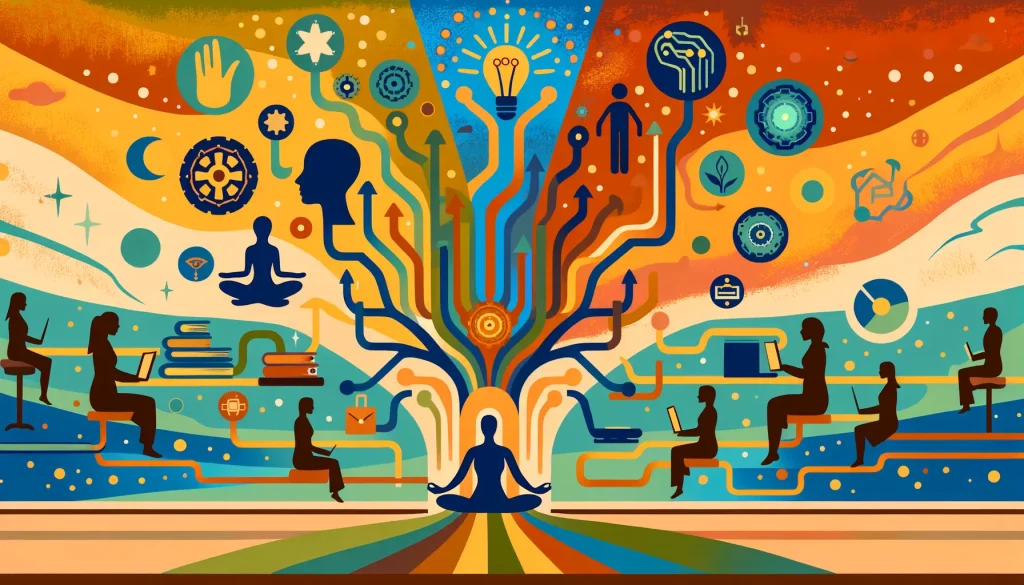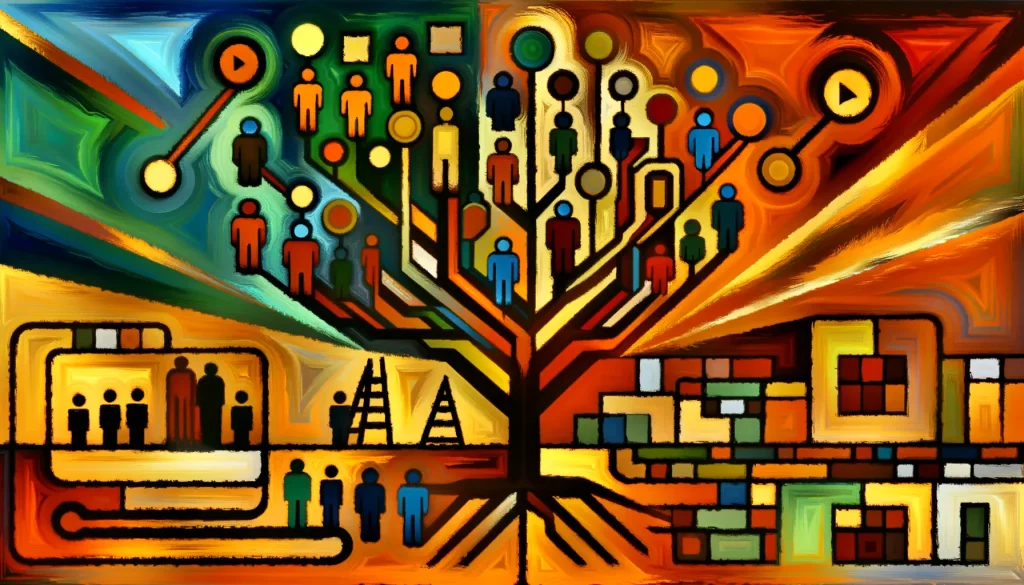The intersection of artificial intelligence and leadership development isn't just a trend, it's transforming how we grow and nurture tomorrow's leaders. I've seen firsthand how AI is creating more personalized, efficient, and impactful leadership journeys. Let's explore how this technology is reshaping the future of leadership development and what it means for your growth as a leader!
Understanding AI's Role in Modern Leadership Development
The landscape of leadership development has undergone a remarkable transformation in recent years. Remember when leadership training meant sitting in a conference room for days, working through the same generic curriculum as everyone else? Those days are rapidly fading.
"What we're seeing is a fundamental shift in how organizations approach leadership development," says Dr. Maria Chen, organizational psychologist and leadership expert. "AI isn't just an add-on; it's becoming the backbone of modern leadership programs."
Traditional leadership development approaches typically followed a one-size-fits-all model, with standardized workshops, occasional coaching, and periodic feedback cycles. These methods, while valuable, often lacked the personalization and continuous reinforcement needed for lasting behavior change.
AI technologies driving this evolution include:
- Natural language processing (NLP) – Analyzing communication patterns and providing feedback on leadership communications
- Machine learning algorithms – Identifying patterns in behavior and predicting leadership effectiveness
- Virtual and augmented reality – Creating immersive practice environments for leadership scenarios
- Predictive analytics – Forecasting leadership potential and development needs
The benefits are substantial. AI-powered leadership development offers scalability, personalization, and data-driven insights that traditional methods simply can't match. However, there are limitations to consider. The technology can't fully replicate the nuanced human judgment and emotional intelligence that experienced mentors provide.
Companies like Microsoft, IBM, and GE have implemented AI-driven leadership platforms that blend algorithmic assessments with human coaching. These hybrid approaches seem to deliver the strongest results, combining technological efficiency with human wisdom.
AI-Powered Personalization in Leadership Learning
Gone are the days when leadership development meant everyone followed the same path regardless of their strengths, weaknesses, or goals. AI is making personalization the norm rather than the exception.
"It's like having a leadership development program that knows you better than you know yourself sometimes," shares Taylor Jackson, Chief Learning Officer at a Fortune 500 technology company. "The AI identifies patterns in your behavior that you might not even recognize."
This personalization manifests in several ways:
- Adaptive learning pathways that evolve based on your progress and performance
- Microlearning recommendations delivered exactly when you need them
- Skill gap analysis that identifies your specific development needs
- Learning style recognition that tailors content to how you best absorb information
For example, some platforms now use AI to analyze a leader's communication patterns during meetings and provide targeted recommendations for improvement. If you tend to interrupt others or dominate conversations, the AI might suggest specific exercises to practice active listening.
The most sophisticated systems create a continuous feedback loop. They gather data from multiple sources—performance reviews, 360-degree feedback, team surveys, even communication analysis—and constantly refine your development plan based on real-world results.
"What makes this approach so powerful is that it's responsive," explains leadership coach Sam Rivera. "Traditional development plans might be updated quarterly at best. AI-powered systems can adapt daily or even hourly based on your actual behavior and results."
Enhancing Emotional Intelligence Through AI
At first glance, using AI to develop emotional intelligence might seem counterintuitive. After all, isn't EI about human connection? But innovative applications are proving remarkably effective at developing this crucial leadership capability.
"We were skeptical at first," admits Jamie Lee, HR Director at a global consulting firm. "But the data showed that leaders using our AI-based EI development tools improved their emotional awareness scores by an average of 32% more than those using traditional methods alone."
Here's how AI is enhancing emotional intelligence development:
- Facial expression and vocal tone analysis during leadership interactions
- Emotional pattern recognition across different situations and contexts
- Real-time emotional awareness prompts during high-stakes conversations
- Virtual reality simulations that practice emotional responses in challenging scenarios
One particularly powerful application involves AI-driven virtual reality. Leaders can practice difficult conversations—like delivering critical feedback or navigating conflicts—in immersive simulations. The AI analyzes their responses and provides guidance on how to improve their emotional approach.
"The VR scenarios gave me a safe space to practice conversations I'd been avoiding," shares operations director Chris Patel. "The AI feedback helped me recognize when I was becoming defensive and suggested alternative approaches. When I finally had the real conversation with my team member, I felt prepared and centered."
Sentiment analysis tools are also helping leaders understand the emotional impact of their communications. Some platforms now scan emails, meeting transcripts, and other communications to identify emotional patterns and suggest adjustments that might improve team dynamics.
However, experts emphasize that AI should complement, not replace, human connection in emotional intelligence development.
"The technology provides insights and practice opportunities," notes EI researcher Dr. Lisa Wong. "But ultimately, emotional intelligence is developed through genuine human relationships and self-reflection. The best programs use AI to inform and enhance those human connections, not substitute for them."
Data-Driven Leadership Coaching with AI
The coaching relationship has long been considered highly personal—a human connection that technology couldn't possibly enhance. Yet AI is now transforming this space, making coaching more accessible, consistent, and measurable.
"AI hasn't replaced our human coaches," explains Alex Rivera, Leadership Development Director at a healthcare organization. "It's amplified them. Our coaches now support twice as many leaders with better results because the AI handles data gathering, pattern recognition, and progress tracking."
Today's AI coaching platforms typically offer:
- 24/7 availability for in-the-moment guidance
- Consistent tracking of leadership behaviors and outcomes
- Objective measurement of progress against goals
- Pattern recognition across situations and over time
- Predictive insights about potential leadership challenges
The most sophisticated systems integrate multiple data sources. They might combine 360-degree feedback with meeting analysis, decision outcomes, team engagement scores, and even biometric data to provide a comprehensive picture of leadership effectiveness.
"What surprised me most was how the AI coach identified patterns I hadn't noticed," shares marketing executive Sasha Kim. "It showed that I was more directive in my communication style when under deadline pressure, which was undermining my team's creativity. My human coach then helped me develop strategies to maintain a more collaborative approach even during stressful periods."
This hybrid model—AI systems providing data and insights that human coaches help interpret and apply—appears to offer the strongest results. The technology handles the heavy lifting of data analysis, while human coaches provide the contextual understanding, emotional support, and accountability that drives lasting behavior change.
"The ROI metrics on our AI-enhanced coaching program showed a 3.2x return compared to our traditional coaching program," notes Chief Learning Officer Jordan Martinez. "Leaders received more consistent support, and the data-driven approach helped them focus on the behaviors that would have the greatest impact."
Implementing AI in Your Leadership Development Strategy
Integrating AI into leadership development isn't just about purchasing new technology—it requires a thoughtful strategy and change management approach. Organizations that successfully implement AI-driven leadership development typically follow a staged process.
"Start small, measure carefully, and scale gradually," advises organizational transformation consultant Maya Johnson. "The organizations that try to overhaul everything at once usually face resistance and disappointing results."
Here's a practical roadmap for implementation:
-
Assessment and Readiness
- Evaluate your current leadership development approach
- Identify specific pain points that AI could address
- Assess your data infrastructure and privacy considerations
- Gauge leadership and participant readiness for AI integration
-
Pilot Program Development
- Select a specific leadership capability or program to enhance with AI
- Choose appropriate AI tools that address your specific needs
- Develop clear success metrics and evaluation methods
- Create a communication plan emphasizing benefits and addressing concerns
-
Implementation and Integration
- Provide thorough training for all stakeholders
- Integrate AI tools with existing systems where possible
- Establish feedback mechanisms for continuous improvement
- Ensure human support is available for technology adoption
-
Scaling and Refinement
- Analyze pilot results against established metrics
- Gather participant feedback on the experience
- Refine the approach based on lessons learned
- Develop a phased plan for wider implementation
Organizations report several common challenges when implementing AI in leadership development:
- Data privacy concerns – Leaders may worry about how their personal data is being used
- Resistance to technology – Some leaders prefer traditional human-only development
- Integration issues – New AI tools may not connect smoothly with existing systems
- Unrealistic expectations – AI is powerful but not magic; setting appropriate expectations is crucial
"The most successful implementations we've seen maintain a 'human in the loop' approach," notes Dr. James Wong, who researches AI applications in organizational development. "They use AI to enhance human judgment rather than replace it, and they're transparent about how the technology works and what data it uses."
Conclusion
The fusion of AI and leadership development represents an exciting frontier in how we develop tomorrow's leaders. By embracing these technological advances while maintaining the human element of leadership, organizations can create more effective, scalable, and personalized development programs. Ready to enhance your leadership development journey? Start by identifying one area where AI could support your growth and take that first step toward the future of leadership development.






